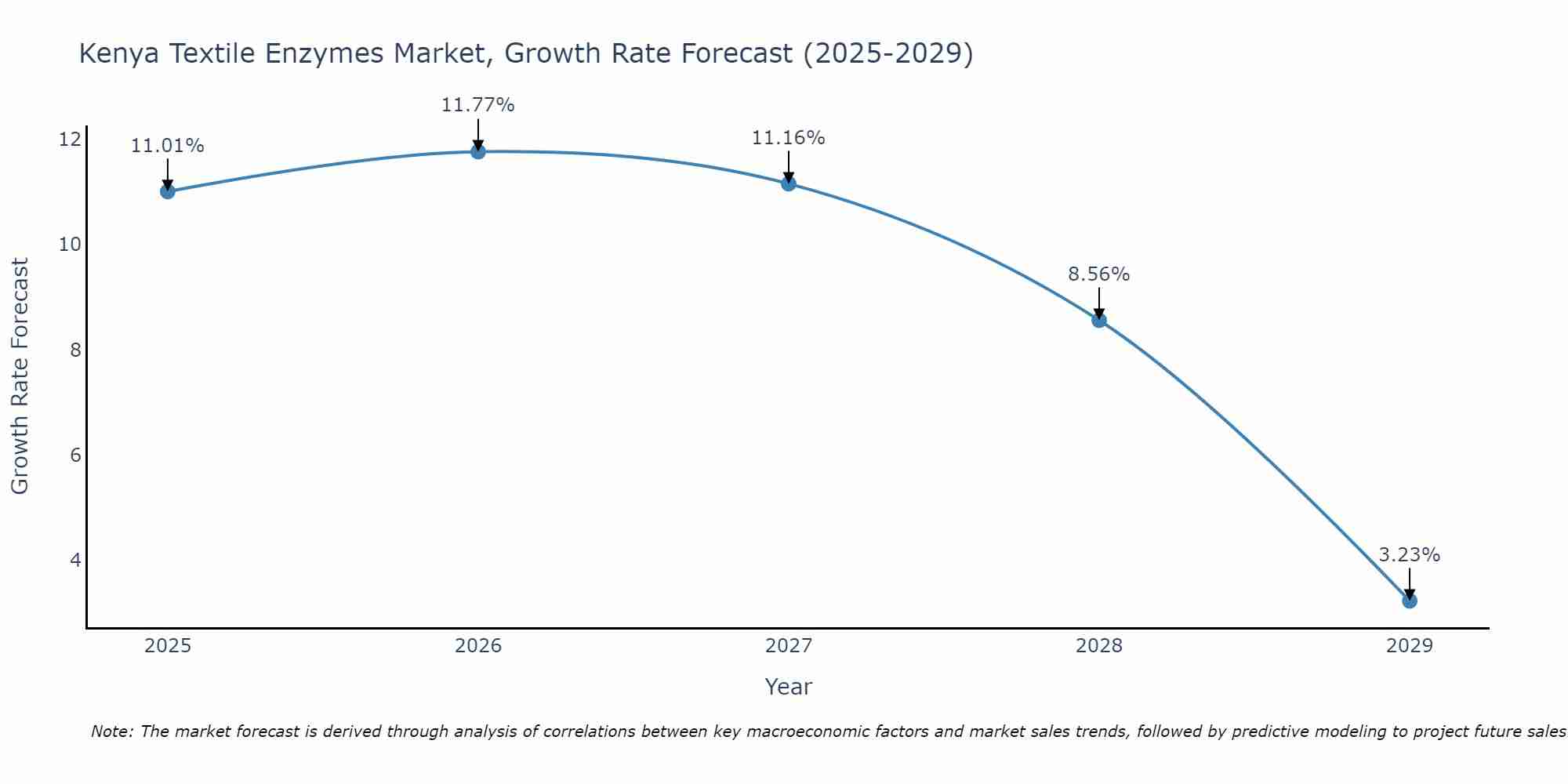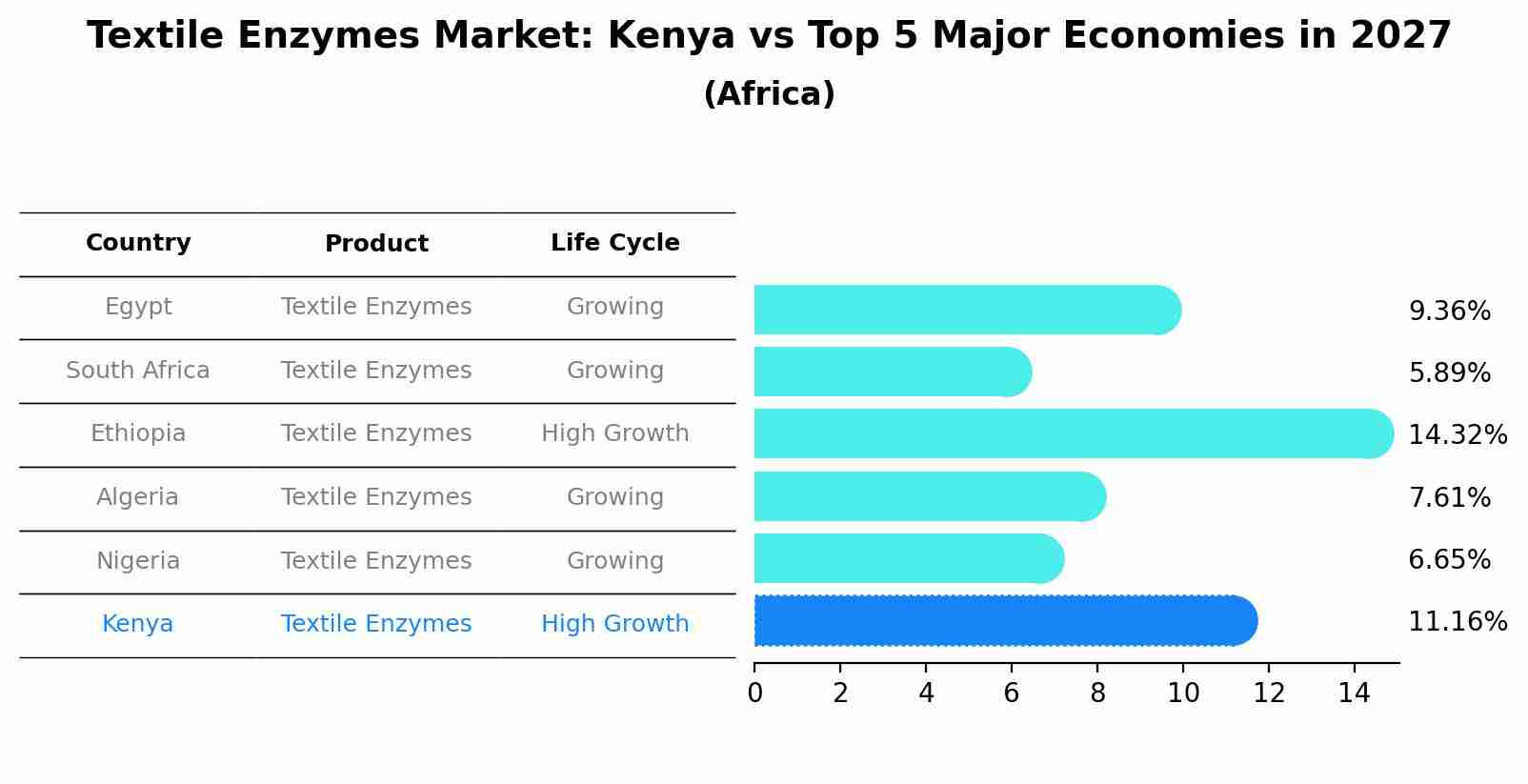Kenya Textile Enzymes Market Outlook | Analysis, Share, Size, Value, Industry, Forecast, Revenue, Trends, COVID-19 IMPACT, Growth & Companies
| Product Code: ETC094089 | Publication Date: Jun 2021 | Updated Date: Jun 2025 | Product Type: Report | |
| Publisher: 6Wresearch | Author: Summon Dutta | No. of Pages: 70 | No. of Figures: 35 | No. of Tables: 5 |
Kenya Textile Enzymes Market Size Growth Rate
The Kenya Textile Enzymes Market is projected to witness mixed growth rate patterns during 2025 to 2029. The growth rate begins at 11.01% in 2025, climbs to a high of 11.77% in 2026, and moderates to 3.23% by 2029.

Textile Enzymes Market: Kenya vs Top 5 Major Economies in 2027 (Africa)
The Textile Enzymes market in Kenya is projected to grow at a high growth rate of 11.16% by 2027, highlighting the country's increasing focus on advanced technologies within the Africa region, where Egypt holds the dominant position, followed closely by South Africa, Ethiopia, Algeria and Nigeria, shaping overall regional demand.

Kenya Textile Enzymes Market Overview
The Kenya Textile Enzymes Market is experiencing steady growth driven by the increasing demand for eco-friendly and sustainable textile production processes. Enzymes play a crucial role in enhancing the efficiency of various textile processes such as desizing, bio-polishing, and denim finishing. Key market players are focusing on product innovation and research to develop enzymes that offer better performance and cost-effectiveness. The market is also witnessing a growing trend towards enzyme-based solutions for reducing water and energy consumption in textile manufacturing. Additionally, the adoption of enzymes in textile production is being encouraged by government regulations promoting sustainable practices in the textile industry. Overall, the Kenya Textile Enzymes Market is poised for further expansion as the textile sector continues to prioritize environmental sustainability and efficiency in production processes.
Kenya Textile Enzymes Market Trends
The Kenya Textile Enzymes Market is witnessing a growing trend towards eco-friendly and sustainable practices. Enzymes are being increasingly used in textile processing to reduce the environmental impact of traditional chemical processes. Demand for enzymes that offer benefits such as reduced water consumption, energy savings, and improved biodegradability is on the rise. Additionally, there is a growing interest in enzymes that enable innovative textile finishes and treatments, such as biopolishing, biofinishing, and denim washing. Manufacturers are investing in research and development to create enzyme solutions that meet the evolving needs of the textile industry while aligning with global sustainability goals. Overall, the market is expected to continue its growth trajectory as consumers and businesses increasingly prioritize environmentally friendly products and processes.
Kenya Textile Enzymes Market Challenges
In the Kenya Textile Enzymes Market, one of the major challenges faced is the lack of awareness and understanding among textile manufacturers regarding the benefits and applications of enzyme products. This results in reluctance to adopt enzyme technology in textile production processes, hindering market growth. Additionally, limited availability of specialized enzymes tailored to suit the specific requirements of the local textile industry poses a challenge. Another issue is the inconsistent quality of enzymes supplied by some manufacturers, leading to concerns about their effectiveness and reliability. Furthermore, the high costs associated with importing enzymes from foreign suppliers also impact market development in Kenya. Overall, addressing these challenges through education, improved product offerings, quality control measures, and local manufacturing capabilities can help unlock the full potential of the Kenya Textile Enzymes Market.
Kenya Textile Enzymes Market Investment Opportunities
The Kenya Textile Enzymes Market presents promising investment opportunities due to the growing textile industry in the country. Enzymes are increasingly being used in textile processing to improve production efficiency, reduce chemical usage, and enhance the quality of finished products. Investors can consider opportunities in supplying textile enzymes to local manufacturers, setting up enzyme production facilities, or partnering with textile companies to provide enzyme solutions. With the Kenyan government`s focus on promoting the manufacturing sector and sustainable practices, investing in the textile enzymes market aligns with the industry trends and offers potential for growth and innovation in the sector. Conducting thorough market research and understanding the specific needs of the Kenyan textile industry will be crucial for successful investment decisions in this market.
Kenya Textile Enzymes Market Government Policy
The government of Kenya has implemented various policies to support and regulate the textile enzymes market. These policies include the establishment of the Kenya Bureau of Standards (KEBS) to ensure quality control and standardization of textile enzymes produced and sold in the country. Additionally, the government has introduced tax incentives and subsidies to encourage investment and growth in the textile industry, which indirectly benefits the enzymes market. Furthermore, there are regulations in place to promote sustainable practices in textile production, including the use of eco-friendly enzymes. Overall, the government policies aim to foster a competitive and sustainable textile enzymes market in Kenya while ensuring consumer safety and environmental protection.
Kenya Textile Enzymes Market Future Outlook
The Kenya Textile Enzymes Market is poised for steady growth in the coming years due to increasing demand for eco-friendly and sustainable textile processes. Enzymes are being widely adopted in the textile industry for applications such as desizing, bio-polishing, and denim finishing, as they offer benefits like reduced water and energy consumption, improved fabric quality, and lower environmental impact. The market is expected to be driven by factors such as the growing awareness of sustainable practices, government initiatives promoting eco-friendly manufacturing processes, and the rising trend of fast fashion. Additionally, advancements in enzyme technology and the development of new enzyme formulations tailored for specific textile applications are likely to further fuel market growth and innovation in the Kenya Textile Enzymes Market.
Key Highlights of the Report:
- Kenya Textile Enzymes Market Outlook
- Market Size of Kenya Textile Enzymes Market, 2021
- Forecast of Kenya Textile Enzymes Market, 2027
- Historical Data and Forecast of Kenya Textile Enzymes Revenues & Volume for the Period 2018 - 2027
- Kenya Textile Enzymes Market Trend Evolution
- Kenya Textile Enzymes Market Drivers and Challenges
- Kenya Textile Enzymes Price Trends
- Kenya Textile Enzymes Porter's Five Forces
- Kenya Textile Enzymes Industry Life Cycle
- Historical Data and Forecast of Kenya Textile Enzymes Market Revenues & Volume By Type for the Period 2018 - 2027
- Historical Data and Forecast of Kenya Textile Enzymes Market Revenues & Volume By Cellulase for the Period 2018 - 2027
- Historical Data and Forecast of Kenya Textile Enzymes Market Revenues & Volume By Amylase for the Period 2018 - 2027
- Historical Data and Forecast of Kenya Textile Enzymes Market Revenues & Volume By Catalase for the Period 2018 - 2027
- Historical Data and Forecast of Kenya Textile Enzymes Market Revenues & Volume By Pectinase for the Period 2018 - 2027
- Historical Data and Forecast of Kenya Textile Enzymes Market Revenues & Volume By Laccase for the Period 2018 - 2027
- Historical Data and Forecast of Kenya Textile Enzymes Market Revenues & Volume By Others for the Period 2018 - 2027
- Historical Data and Forecast of Kenya Textile Enzymes Market Revenues & Volume By Application for the Period 2018 - 2027
- Historical Data and Forecast of Kenya Textile Enzymes Market Revenues & Volume By Bio-polishing for the Period 2018 - 2027
- Historical Data and Forecast of Kenya Textile Enzymes Market Revenues & Volume By Desizing for the Period 2018 - 2027
- Historical Data and Forecast of Kenya Textile Enzymes Market Revenues & Volume By Enzymatic Bleaching for the Period 2018 - 2027
- Historical Data and Forecast of Kenya Textile Enzymes Market Revenues & Volume By Bioscouring for the Period 2018 - 2027
- Historical Data and Forecast of Kenya Textile Enzymes Market Revenues & Volume By Others for the Period 2018 - 2027
- Kenya Textile Enzymes Import Export Trade Statistics
- Market Opportunity Assessment By Type
- Market Opportunity Assessment By Application
- Kenya Textile Enzymes Top Companies Market Share
- Kenya Textile Enzymes Competitive Benchmarking By Technical and Operational Parameters
- Kenya Textile Enzymes Company Profiles
- Kenya Textile Enzymes Key Strategic Recommendations
Frequently Asked Questions About the Market Study (FAQs):
- Single User License$ 1,995
- Department License$ 2,400
- Site License$ 3,120
- Global License$ 3,795
Search
Thought Leadership and Analyst Meet
Our Clients
Related Reports
- Canada Oil and Gas Market (2026-2032) | Share, Segmentation, Value, Industry, Trends, Forecast, Analysis, Size & Revenue, Growth, Competitive Landscape, Outlook, Companies
- Germany Breakfast Food Market (2026-2032) | Industry, Share, Growth, Size, Companies, Value, Analysis, Revenue, Trends, Forecast & Outlook
- Australia Briquette Market (2025-2031) | Growth, Size, Revenue, Forecast, Analysis, Trends, Value, Share, Industry & Companies
- Vietnam System Integrator Market (2025-2031) | Size, Companies, Analysis, Industry, Value, Forecast, Growth, Trends, Revenue & Share
- ASEAN and Thailand Brain Health Supplements Market (2025-2031) | Strategy, Consumer Insights, Analysis, Investment Trends, Opportunities, Growth, Size, Share, Industry, Revenue, Segments, Value, Segmentation, Supply, Forecast, Restraints, Outlook, Competition, Drivers, Trends, Demand, Pricing Analysis, Competitive, Strategic Insights, Companies, Challenges
- ASEAN Bearings Market (2025-2031) | Strategy, Consumer Insights, Analysis, Investment Trends, Opportunities, Growth, Size, Share, Industry, Revenue, Segments, Value, Segmentation, Supply, Forecast, Restraints, Outlook, Competition, Drivers, Trends, Demand, Pricing Analysis, Competitive, Strategic Insights, Companies, Challenges
- Europe Flooring Market (2025-2031) | Outlook, Share, Industry, Trends, Forecast, Companies, Revenue, Size, Analysis, Growth & Value
- Saudi Arabia Manlift Market (2025-2031) | Outlook, Size, Growth, Trends, Companies, Industry, Revenue, Value, Share, Forecast & Analysis
- Uganda Excavator, Crane, and Wheel Loaders Market (2025-2031) | Strategy, Consumer Insights, Analysis, Investment Trends, Opportunities, Growth, Size, Share, Industry, Revenue, Segments, Value, Segmentation, Supply, Forecast, Restraints, Outlook, Competition, Drivers, Trends, Demand, Pricing Analysis, Competitive, Strategic Insights, Companies, Challenges
- Rwanda Excavator, Crane, and Wheel Loaders Market (2025-2031) | Strategy, Consumer Insights, Analysis, Investment Trends, Opportunities, Growth, Size, Share, Industry, Revenue, Segments, Value, Segmentation, Supply, Forecast, Restraints, Outlook, Competition, Drivers, Trends, Demand, Pricing Analysis, Competitive, Strategic Insights, Companies, Challenges
Industry Events and Analyst Meet
Whitepaper
- Middle East & Africa Commercial Security Market Click here to view more.
- Middle East & Africa Fire Safety Systems & Equipment Market Click here to view more.
- GCC Drone Market Click here to view more.
- Middle East Lighting Fixture Market Click here to view more.
- GCC Physical & Perimeter Security Market Click here to view more.
6WResearch In News
- Doha a strategic location for EV manufacturing hub: IPA Qatar
- Demand for luxury TVs surging in the GCC, says Samsung
- Empowering Growth: The Thriving Journey of Bangladesh’s Cable Industry
- Demand for luxury TVs surging in the GCC, says Samsung
- Video call with a traditional healer? Once unthinkable, it’s now common in South Africa
- Intelligent Buildings To Smooth GCC’s Path To Net Zero


















